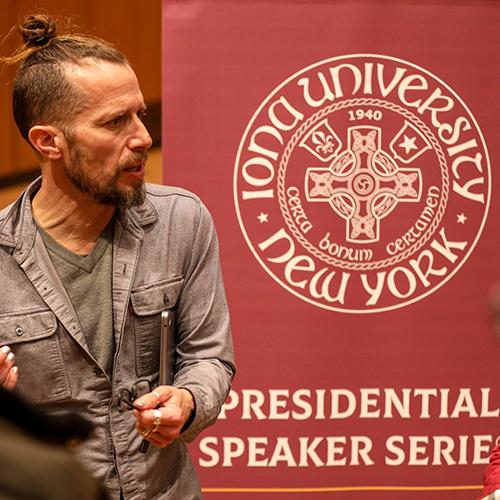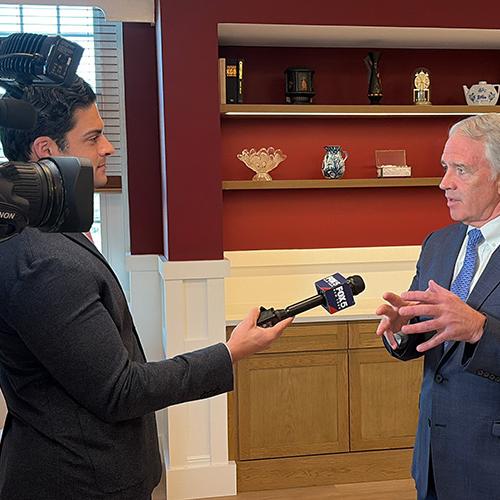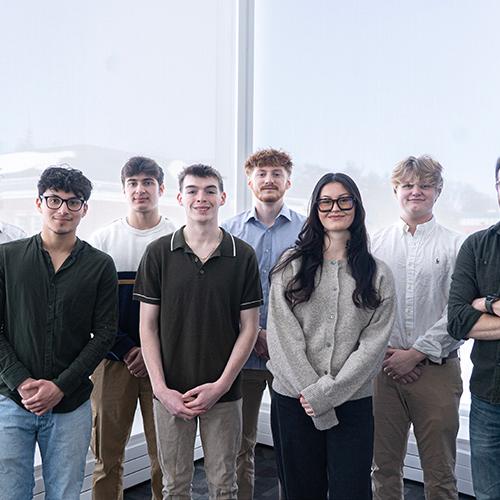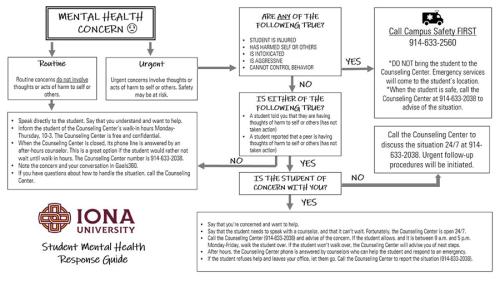Getting Help for a Student
DETERMINING LEVEL OF NEED
We want to be open to a student’s feelings and provide support through our conversations and relationships, but we don’t want to fail to recognize signs that professional intervention is necessary.
We also don’t want to overreact (i.e. to respond to a student as if the student is in crisis when no emergency exists).
The Student Mental Health Response Guide is a useful tool for determining a student’s level of need.
Student Mental Health Response Guide
Routine
Routine concerns do not involve thoughts or acts of harm to self or others.
- Speak directly to the student. Say that you understand and want to help.
- Inform the student of the Counseling Center's walk-in hours Monday-Thursday, 10 a.m.-3 p.m. The Counseling Center is free and confidential.
- When the Counseling Center is closed, its phone line is answered by an after-hours counselor. This is a great option if the student would rather not wait until walk-in hours. The Counseling Center number is (914) 633-2038.
- Note the concern and your conversation in Gaels360.
- If you have questions about how to handle the situation, call the Counseling Center.
Urgent Concerns
Urgent concerns involve thoughts or acts of harm to self or others. Safety may be at risk.
Are any of the following true?
- STUDENT IS INJURED
- HAS HARMED SELF OR OTHERS
- IS INTOXICATED
- IS AGGRESSIVE
- CANNOT CONTROL BEHAVIOR
Is either of the following true?
- A student told you that they are having thoughts of harm to self or others has not taken action.
- A student reported that a peer is having thoughts of harm to self or others has not taken action.
Is the student of concern with you?
- Say that you're concerned and want to help.
- Say that the student needs to speak with a counselor, and that it can't wait. Fortunately, the Counseling Center is open 24/7.
- Call the Counseling Center (914) 633-2038 and advise of the concern. If the student allows, and it is between 9 a.m. and 5 p.m.
- Monday-Friday, walk the student over. If the student won't walk over, the Counseling Center will advise you of next steps
- After hours, the Counseling Center phone is answered by counselors who can help the student and respond to an emergency.
- If the student refuses help and leaves your office, let them go. Call the Counseling Center to report the situation (914) 633-2038.
Call the Counseling Center to discuss the situation 24/7 at (914) 633-2038. Urgent follow-up procedures will be initiated.
Call the Counseling Center
Call the Counseling Center to discuss the situation 24/7 at (914) 633-2038. Urgent follow-up procedures will be initiated.
Call Campus Safety First
- DO NOT bring the student to the Counseling Center. Emergency services will come to the student's location.
- When the student is safe, call the Counseling Center at (914) 633-2038 to advise of the situation.
An image version of this guide can be found below.



